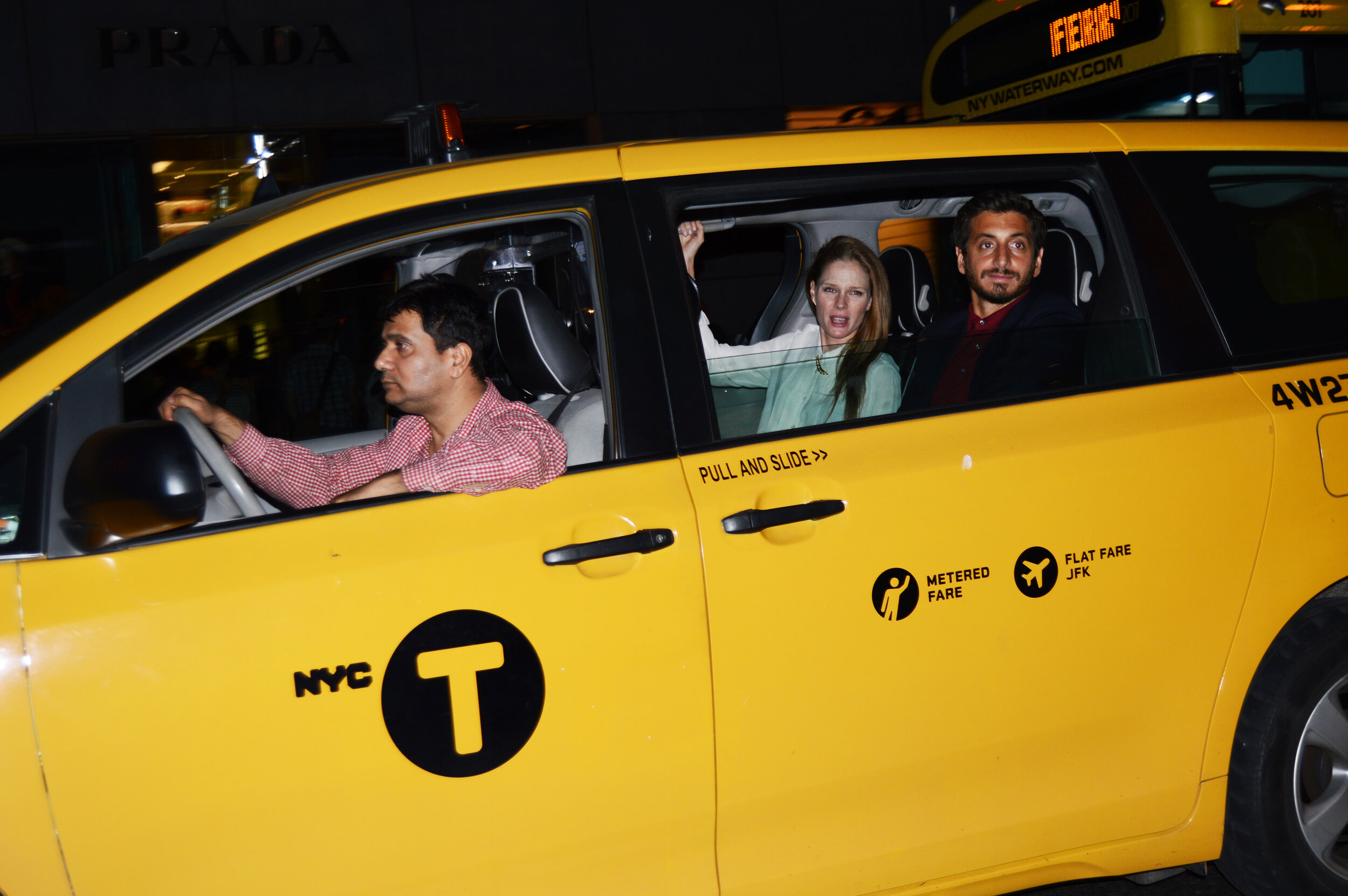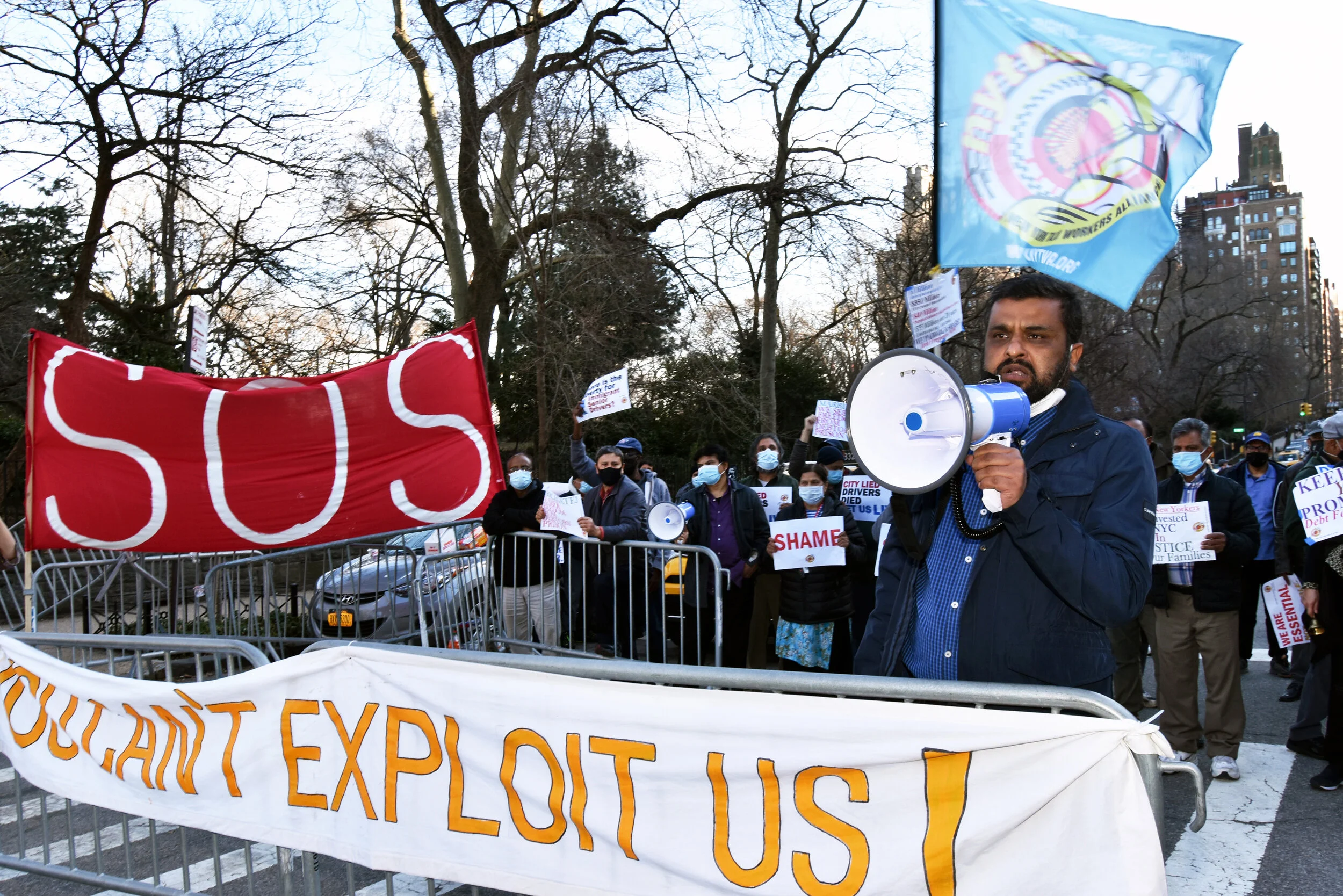"They’re monsters." New York's $65 million bailout plan helps lenders, not drivers, says a top taxi driver advocate
New York City is offering taxi medallion owners money to refinance their debt, but drivers say they need relief, not restructuring.
Taxi drivers angry with New York City’s “bailout” plan. Photo: Nina Roberts
Published on Business of Business on March 3, 2021
Angry taxi drivers have been protesting in reaction to Mayor Bill de Blasio’s meek relief proposal announced on Tuesday March 9, aimed at helping taxi drivers. Some drivers are drowning in debt due to steep fees when investing in a taxi medallion and predatory lending practices. The pandemic has added another layer of desperation for drivers: in November 2020 the industry was earning 81% less the year prior.
Taxi medallions, needed to operate a taxi legally, sell at fluctuating prices. The going rate is approximately $75,000, but just seven years ago a medallion was auctioned with a starting bid of $280,000, according to Bhairavi Desai, the Executive Director the non-profit union New York Taxi Workers Alliance (NYTWA). Desai is a vocal opponent of the city’s taxi medallion relief proposal, saying it prioritizes lending institutions, such as the hedge fund Marblegate, the largest holder of medallion loans, and not the drivers.
Taxi drivers protesting outside Gracie Mansion for a fair bailout plan. Photo: Nina Roberts
The city’s taxi medallion relief plan totaling $65 million, made possible by the federal stimulus plan, would provide $20,000 for restructuring medallion debt for each owner/driver and $9,000 towards debt relief. But taxi medallion owners/drivers say they need debt relief, not to take on more loans. The city’s proposal has been called a “disgrace” by Comptroller Scott Stringer, and Desai is calling for an investigation.
Desai spoke with The Business of Business to explain how the Greenwich, Connecticut based hedge fund Marblegate has been benefitting from medallion debt since 2018 and would from Mayor de Blasio’s recent proposal.
Nina Roberts: What is Marblegate’s relationship to the city’s taxi medallion debt?
Bhairavi Desai: In 2018 they bought about 300 taxi medallions, hedging their bets on the struggling industry; Uber and Lyft (which don’t require medallions) were just flourishing. Since February 2020, Marblegate started to purchase the medallion loans from lenders.
In the proposal that the city just announced, medallion owners can borrow $20,000 from the city at zero interest, but it must be used as leverage to negotiate debt restructuring. So, the city's plan is to essentially loan owner/drivers $20,000 that they can then turn around and offer to the lender, Marblegate, or banks, or credit unions, with no concessions from the lenders as to what the new balance would be on these loans.
Medallion owners can then borrow another $9,000 from the city to use towards monthly payments. Basically, the city's answer to drivers in debt is to put them in debt with the city itself. It’s so scandalous.
The city is keeping lenders, like Marblegate, whole through COVID, even though 82% of drivers didn't have enough money for food and meals, 40% of drivers had COVID and were quarantined at home or in the hospital.
NR: What if the downturn of taxi riding continues?
BD: Medallion owners/drivers are going to end up being in deeper debt, or living on credit cards, or going into bankruptcy.
Let's say Marblegate seizes your medallion and at that point the value of your medallion is $75,000, maybe your balance is $275,000. They’ll go to court for the outstanding $200,000; if you have a house, they'll go after the equity, wage garnishing, or other assets. The city has not protected the drivers against any of this.
NR: How many medallions are there in New York City?
BD: There are about 13,560 medallions in the city, but we don't know exactly how many of the loans are underwater. At one point, the City Council Medallion Task Force said it was around 6,000, but it could be 3,000 to 6,000.
NR: What do you consider a fair bailout for medallion owners?
BD: Our proposal has been that the city set up a backstop—if the hedge fund or bank reduced the debt to $125,000, the City of New York would guarantee it, 100% of delinquency. The medallion owners are protected and the banks and hedge fund would be guaranteed $125,000, even if the debt is $300,000 for example.
Marblegate can only collect amounts like $300,000 if people own assets; they're hedging their bets on enough of the drivers having assets.
Even in the worse case scenario, our plan would end up costing the city $75 million over 20 years. Our plan is more fiscally sound and would be life-saving. Their plan costs more and does absolutely nothing, offers no relief.
NR: Why are politicians being so callous to the drivers, especially after the pandemic?
BD: I think they're thinking about their next corporate gig because it's a lame duck year. Many of them come out of finance; they're making their plans to go back into finance. You know, how great to have on your resume, “Hey, I secured $65 million for a hedge fund’s portfolio.”
NR: The majority of the medallion owners are immigrants, many are on the older side. These are the people that could be tossed into the street?
BD: Exactly. They are facing the loss of their investment, their job and the risk of losing their homes and any other asset that they hold.
Everyone was blindsided by this proposal, everybody. The New York City Taxi and Limousine Commission (TLC) never met with the drivers, they didn't talk to the City Council.
NR: The TLC Commissioner Aloysee Heredia Jarmoszuk think this is fair program for medallion owners struggling with debt?
BD: Yes, she presented the proposal along with the mayor. But we have questions. When did they start negotiating this with Marblegate? How many other lenders did they speak with? Who did they notify first?
NR: Can you do see a mayoral candidate that would have the best interests of the drivers in mind?
BD: We’re a not for profit so we don't do endorsements, I wouldn't comment on that. But of the mayoral candidates, the one who has been the most vocal through his current position as Comptroller is Scott Stringer, he supported our plan.
NR: The city’s proposal sounds shady.
BD: We're calling for an investigation. The city did nothing to help the drivers. I mean, you can quote me saying this: they’re monsters.
This Q&A has been edited and condensed for clarity.

